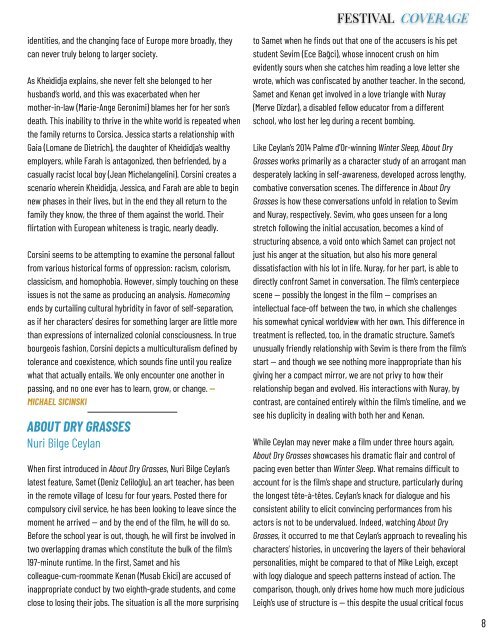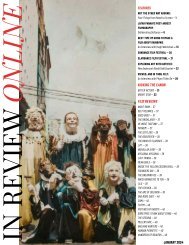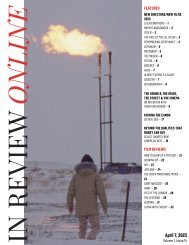Create successful ePaper yourself
Turn your PDF publications into a flip-book with our unique Google optimized e-Paper software.
FESTIVAL COVERAGE<br />
identities, and the changing face of Europe more broadly, they<br />
can never truly belong to larger society.<br />
As Kheìdidja explains, she never felt she belonged to her<br />
husband’s world, and this was exacerbated when her<br />
mother-in-law (Marie-Ange Geronimi) blames her for her son’s<br />
death. This inability to thrive in the white world is repeated when<br />
the family returns to Corsica. Jessica starts a relationship with<br />
Gaia (Lomane de Dietrich), the daughter of Kheìdidja’s wealthy<br />
employers, while Farah is antagonized, then befriended, by a<br />
casually racist local boy (Jean Michelangelini). Corsini creates a<br />
scenario wherein Kheìdidja, Jessica, and Farah are able to begin<br />
new phases in their lives, but in the end they all return to the<br />
family they know, the three of them against the world. Their<br />
flirtation with European whiteness is tragic, nearly deadly.<br />
Corsini seems to be attempting to examine the personal fallout<br />
from various historical forms of oppression: racism, colorism,<br />
classicism, and homophobia. However, simply touching on these<br />
issues is not the same as producing an analysis. Homecoming<br />
ends by curtailing cultural hybridity in favor of self-separation,<br />
as if her characters’ desires for something larger are little more<br />
than expressions of internalized colonial consciousness. In true<br />
bourgeois fashion, Corsini depicts a multiculturalism defined by<br />
tolerance and coexistence, which sounds fine until you realize<br />
what that actually entails. We only encounter one another in<br />
passing, and no one ever has to learn, grow, or change. <strong>—</strong><br />
MICHAEL SICINSKI<br />
ABOUT DRY GRASSES<br />
Nuri Bilge Ceylan<br />
When first introduced in About Dry Grasses, Nuri Bilge Ceylan’s<br />
latest feature, Samet (Deniz Celiloğlu), an art teacher, has been<br />
in the remote village of Icesu for four years. Posted there for<br />
compulsory civil service, he has been looking to leave since the<br />
moment he arrived <strong>—</strong> and by the end of the film, he will do so.<br />
Before the school year is out, though, he will first be involved in<br />
two overlapping dramas which constitute the bulk of the film’s<br />
197-minute runtime. In the first, Samet and his<br />
colleague-cum-roommate Kenan (Musab Ekı̇cı̇) are accused of<br />
inappropriate conduct by two eighth-grade students, and come<br />
close to losing their jobs. The situation is all the more surprising<br />
to Samet when he finds out that one of the accusers is his pet<br />
student Sevim (Ece Bağci), whose innocent crush on him<br />
evidently sours when she catches him reading a love letter she<br />
wrote, which was confiscated by another teacher. In the second,<br />
Samet and Kenan get involved in a love triangle with Nuray<br />
(Merve Dı̇zdar), a disabled fellow educator from a different<br />
school, who lost her leg during a recent bombing.<br />
Like Ceylan’s 2014 Palme d’Or-winning Winter Sleep, About Dry<br />
Grasses works primarily as a character study of an arrogant man<br />
desperately lacking in self-awareness, developed across lengthy,<br />
combative conversation scenes. The difference in About Dry<br />
Grasses is how these conversations unfold in relation to Sevim<br />
and Nuray, respectively. Sevim, who goes unseen for a long<br />
stretch following the initial accusation, becomes a kind of<br />
structuring absence, a void onto which Samet can project not<br />
just his anger at the situation, but also his more general<br />
dissatisfaction with his lot in life. Nuray, for her part, is able to<br />
directly confront Samet in conversation. The film’s centerpiece<br />
scene <strong>—</strong> possibly the longest in the film <strong>—</strong> comprises an<br />
intellectual face-off between the two, in which she challenges<br />
his somewhat cynical worldview with her own. This difference in<br />
treatment is reflected, too, in the dramatic structure. Samet’s<br />
unusually friendly relationship with Sevim is there from the film’s<br />
start <strong>—</strong> and though we see nothing more inappropriate than his<br />
giving her a compact mirror, we are not privy to how their<br />
relationship began and evolved. His interactions with Nuray, by<br />
contrast, are contained entirely within the film’s timeline, and we<br />
see his duplicity in dealing with both her and Kenan.<br />
While Ceylan may never make a film under three hours again,<br />
About Dry Grasses showcases his dramatic flair and control of<br />
pacing even better than Winter Sleep. What remains difficult to<br />
account for is the film’s shape and structure, particularly during<br />
the longest tête-à-têtes. Ceylan’s knack for dialogue and his<br />
consistent ability to elicit convincing performances from his<br />
actors is not to be undervalued. Indeed, watching About Dry<br />
Grasses, it occurred to me that Ceylan’s approach to revealing his<br />
characters’ histories, in uncovering the layers of their behavioral<br />
personalities, might be compared to that of Mike Leigh, except<br />
with logy dialogue and speech patterns instead of action. The<br />
comparison, though, only drives home how much more judicious<br />
Leigh’s use of structure is <strong>—</strong> this despite the usual critical focus<br />
8
















